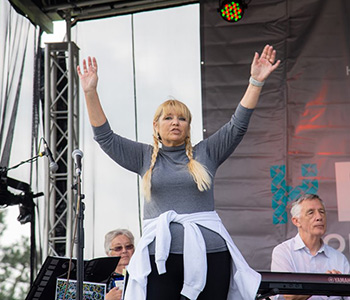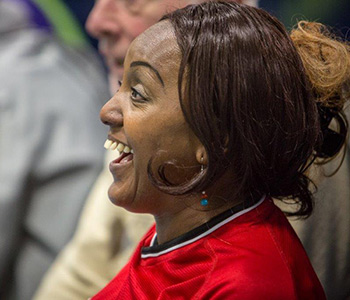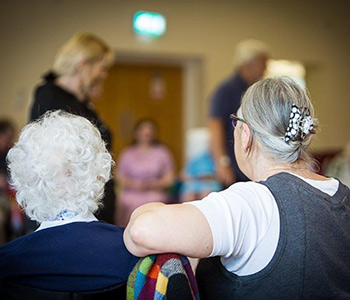So – we’re in election time – again! I was listening to the radio this week to a piece about how the different political parties have key messages which they want to get across. Because there are very strict rules about Party Political advertising during election periods, the Parties must try to get their slogans in to the interviews they give as often as possible. Like advertising slogans – but hidden. That’s why we – the great British public – get to hear these phrases repeated over and over again. This shows how important language is.
We see how important language is in dementia care as well. We know that the way we use words shapes our culture so we really must make sure we are using the right ones. Language changes and evolves over time, and it is quite easy to find ourselves stuck with words whose meaning has subtly changed because Society has changed. This is especially true with words we use all the time. We carry on using them because we always have. We don’t ask ourselves if we are saying what we really mean now in 2019.
For a long time, I have had my doubts about the words CARER. This is partly because, in the UK, it is used to describe two groups of people. Carers may either be people who are supporting a person in the context of an ongoing relationship, or they may be people who are doing a job for which they are paid. The Oxford English Dictionary definition is “a family member or paid helper who regularly looks after a child or a sick, elderly or disabled person”. (Even this does not include the friend or neighbour who may be offering the support).
But it is also because the word implies that “we are doing to rather than doing with” another person. And that is not what we are about.
People with dementia are active on the internet now and they are becoming pretty vocal about this whole question of the word ‘care’. If anyone is interested, I would recommend looking at www.dementiaallianceinternational.org. Their strap line is “Nothing about us without us”. Co-founder and C.E.O Kate Swaffer is an Australian. I am glad to say that among the various people from North America, Agnes Houston and James McKillop of the Scottish Dementia Working Group are active members of the Board. All these people are living with dementia.
So, to get back to the word Carer. Kate Swaffer refers to her husband as her B.U.B. or “Back up Brain”. Christine Bryden – another Australian activist refers to her husband as her Enabler or Supporter and describes them doing the dementia dance with all its’ twists and turns – together. Both these amazing women say they could not survive without their husband’s love and support. But they deny that they are their ‘carers’. They say that the word puts them into the position of ’victim’ and encourages the habit of ‘learned helplessness’ where the person with dementia relies so entirely on the other person that they lose their remaining abilities prematurely.
In this past week, I brought up this subject in the different groups with which I am involved. In Support 4 Memory- whose members are newly diagnosed; the word ‘carer’ did not seem to apply at all. There was no question. These were all – in this group – married couples of husbands and wives. And that was the language they used about each other. In the Clear Voices group in which all members are people with dementia attending without a ‘carer’ – the word is never mentioned at all. People refer to their husbands, wives, sons and daughters. So, I guessed that an answer might be that the language changes as the dementia progresses. In the early stages people do not think of themselves as carers but are doing their best to provide the additional support needed within the narrative of a ’normal’ family life. And I expected that as more help is needed, and the role changes people might feel that they have morphed from one to the other – Spouse to Carer.
So, I consulted the people at an Encompass carer’s group in their different roles. In this group, all married or widowed. Three of them have a spouse in a care home, the others are living at home with dementia at different points in the journey. When asked if they were husband/wife or carer the replies were surprisingly very mixed. Ranging from a definite “I am a carer” to “he is definitely my husband”, with all stages in between. So, I am left still thinking about it.
It must be about the quality of the relationship, the individual’s feelings about themselves and the other person. As well as about how much support is needed. Some people with relatives who have moved into a care home feel that they have regained their family role because other people are now doing the physical ‘caring.’
In any case I really think that the time has come for another word especially for neurodegenerative conditions where it can become so hard to find the unique person who we know is still there. And to honour them.
“What’s in a name?” Shakespeare asked.
The answer is – an awful lot.




